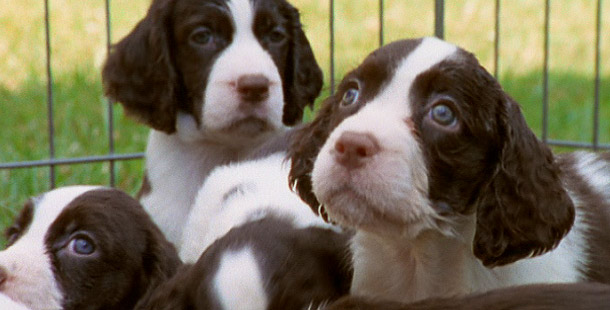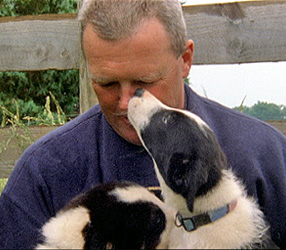Why do puppies make such wonderful pets? “If you have to ask, you’ve never owned a dog,” laughs Ellen Hovde of Middlemarch Films, one of the two producer-directors of NATURE’s Dogs: The Early Years. “It’s a matter of unquestioning love: you don’t get it from people, but you get it from dogs.”
Dogs and humans are ideal partners. That’s partly because the dog is a social animal that thrives in the company of his family, whether canine or human. Dogs are by nature loving, loyal, protective, and, in many cases, model employees: “Dogs began as wolves and were bred by human beings for very specific jobs,” Hovde explains. “You have dogs that were bred as workers, like service and seeing-eye dogs, hunting dogs, dogs that were bred as companions. For hundreds of years, we’ve been refining them.” The end result of this careful breeding: a species designed to be our ideal partners in work and play.
Has reading all this made you want a puppy of your own? Before you make your decision, think carefully. Puppies — who grow up to be bigger, somewhat less cute dogs — require lots of attention and more than a little cash. Imagine training a squirmy, energetic puppy to come, sit, and stay. Remember that for the rest of her life, you’ll be walking your pooch several times a day and paying for food, medical care, and supplies. Are you ready for the time commitment and financial responsibility? Will you still be in love with your adorable little puppy when she grows up to be a large, messy dog that may outweigh you? If the answer is still yes, here are some tips on achieving puppy love.
Mutts vs. Purebreds:
There are two basic varieties of puppies: purebreds and mixed breeds, sometimes called mutts or mongrels. If you adopt from a shelter, you’ll probably be taking home a mixed-breed dog. Owning a mutt comes with some advantages. For one thing, getting one can be much less expensive than purchasing a purebred from a breeder, which can cost hundreds of dollars. Then too, mutts are free of some of the genetic health problems from which purebred dogs can suffer. It’s also a wonderful feeling to know you’ve saved a dog’s life! Petfinder can help you locate a shelter in your area.
If you’re looking for a purebred, examine your motives: Are you trying to replace a dog you loved as a child? Do you admire a friend’s pedigreed pup? Have you always liked the looks of a particular breed? Think about it carefully. What makes a “good dog” is temperament and training, not looks. The most important thing about the puppy you take home is that you get along well.
Buyer Beware
If you have your heart set on taking home a specific breed, a breeder is the way to go. Inbreeding — the breeding of animals related to one another — can result in inborn illnesses in purebred dogs. Experts caution that many of the dogs for sale at pet stores come from “puppy mills” where inbreeding has led to health problems. So it’s important to get your purebred dog from a responsible breeder; even though it’s more expensive, your dog is much more likely to be healthy. To find a breeder near you, check out the American Kennel Club’s Breeder Referral Search.
Here are some people-friendly dog breeds:
Golden retriever: A warm, gentle, laid-back breed.
Shetland sheepdog: Very energetic and fun-loving, eager to please.
Labrador retriever: The ideal family dog, sweet-natured and loyal.
German shepherd: Intelligent, agreeable, obedient — a good all-around dog.
Maltese: Excellent with children, needs less exercise than larger breeds.
Poodle: Responsive, easy to train, and extraordinarily bonded to its humans.
No matter what kind of puppy you decide to take home, don’t make your decision based on looks alone. Spend as much time with the dog as you can and try to gauge her temperament: Is she shy? Friendly? Aggressive? See how she reacts to strangers and surprises like loud noises. Some early detective work can help you find just the right puppy for you.
Puppy Health
Once you get your puppy home, make sure that your new friend is in the best of health, physically and mentally. Here are some things you should expect to take care of:
Spaying/neutering: Fixing your puppy helps cut down on pet overpopulation.
Vet visits: Schedule an annual trip to the veterinarian for a routine examination that includes shots, and flea and tick prevention. A sick or injured dog may require more care, meaning higher bills.
Training: For your and his own safety, it’s essential to train your puppy to heed your commands, from “sit” to “stay,” “come” to “heel,” and many more. If you’re having trouble training him yourself, a local obedience school can work wonders.
Dog license: Your town may require that you license your dog and get a set of tags to show that she’s had her shots.
Essential Puppy Supplies
Keep your dog happy, healthy, and safe by having these on hand:Leash: Keep your puppy from running off when you go out. Leather leashes cost more than cotton or nylon ones, but can be more comfortable for you to hold.
Collar: Think loose: you should be able to get two fingers between the collar and your dog’s neck.
I.D. tag: Put your phone number on your puppy’s tag in case she ever wanders off.
Dog brush: Brushing your puppy often will keep her coat healthy and shiny.
Shampoo: Experts recommend bathing your puppy about once a week.
Nail clippers: Clip your puppy’s nails regularly to keep them from cracking and splintering.
Food bowl: If your puppy is a larger variety, she may be more comfortable eating out of a raised dish.
Water dish: Every day, dogs need to consume about two and a half times as much water as food, so make sure to refill the bowl often with clean water.
Toys: If you don’t get him a toy to sink his teeth into, your puppy may give your shoe a chew instead











